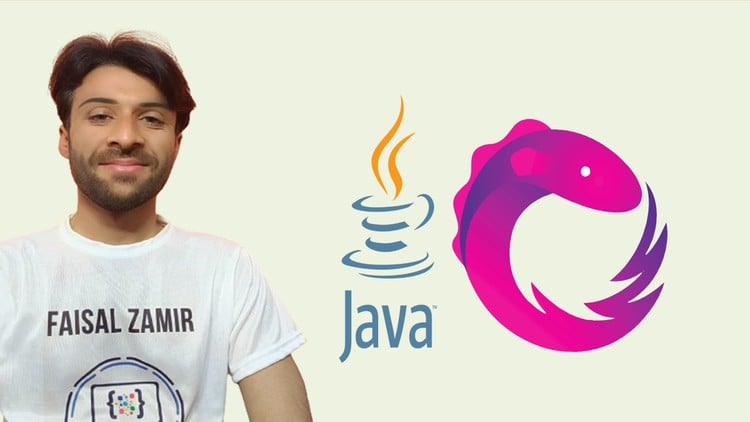
Master Java Reactive Programming: Elevate Your Skills, Ace the Exam, Ignite Your Expertise!
⭐ 3.64/5 rating
👥 4,908 students
🔄 April 2024 update
Add-On Information:
Note➛ Make sure your 𝐔𝐝𝐞𝐦𝐲 cart has only this course you're going to enroll it now, Remove all other courses from the 𝐔𝐝𝐞𝐦𝐲 cart before Enrolling!
-
Course Overview
- Dive deep into the paradigm of Reactive Programming in Java, exploring its fundamental principles and immense advantages in building high-performance, resilient, and scalable applications. This course is meticulously designed to not just introduce you to reactive concepts but to solidify your understanding and practical application, specifically geared towards mastery and exam readiness.
- Unravel the complexities of asynchronous data streams and event-driven architectures with Project Reactor, the leading reactive library for Java. Understand how to effectively manage sequences of data, transform them, and handle errors in a non-blocking fashion, crucial for modern microservices and cloud-native development.
- Focus on the practical implementation of Mono and Flux, the core building blocks of Project Reactor, mastering their extensive operator set for data manipulation, combination, and error handling. You’ll learn to architect systems that are inherently responsive and fault-tolerant.
- This isn’t merely a theoretical exploration; the course emphasizes hands-on application and skill validation. Through carefully crafted exercises and challenge-based learning, you will continuously test your comprehension and ability to apply reactive patterns in real-world scenarios, ensuring you’re thoroughly prepared for any certification exam or advanced interview.
- Stay current with the latest features and best practices, as the course content reflects the April 2024 update, ensuring you’re learning the most relevant and up-to-date techniques in the Java reactive ecosystem. Prepare to elevate your expertise.
-
Requirements / Prerequisites
- A solid foundation in Java programming (Java 8 or higher) is essential, including a strong grasp of Object-Oriented Programming (OOP) concepts, interfaces, abstract classes, and lambda expressions. Familiarity with Java Stream API is highly beneficial.
- Basic understanding of concurrency and multithreading in Java, including concepts like threads, executors, and synchronization, will provide valuable context.
- Comfort with using an Integrated Development Environment (IDE) such as IntelliJ IDEA, Eclipse, or VS Code.
- Familiarity with build automation tools like Maven or Gradle for managing project dependencies.
- A desire to learn and commitment to practicing coding exercises. No prior experience with Reactive Programming frameworks is necessary.
-
Skills Covered / Tools Used
- Core Reactive Principles: Understanding the Reactive Manifesto, push vs. pull models, asynchronous programming, non-blocking I/O.
- Project Reactor Mastery: In-depth knowledge of Mono and Flux publishers, their lifecycle, and extensive operator usage for transformation, filtering, combining, and error handling.
- Backpressure Management: Implementing strategies to effectively manage upstream data flow to prevent consumer overload, ensuring system stability.
- Schedulers and Concurrency: Mastering Reactor’s Schedulers for managing execution contexts, enabling parallel processing.
- Testing Reactive Code: Practical application of JUnit 5 and Reactor Test utilities (StepVerifier) for thoroughly testing asynchronous and reactive flows.
- Error Handling Strategies: Implementing resilient error recovery, retries, and fallback mechanisms within reactive pipelines.
- Hot vs. Cold Publishers: Differentiating between and effectively utilizing hot and cold reactive streams.
- Interoperability: Understanding how reactive streams can interact with traditional blocking code.
- Development Environment: Hands-on experience with Java Development Kit (JDK) 8+, modern IDEs (IntelliJ IDEA, Eclipse), and Maven/Gradle.
-
Benefits / Outcomes
- Achieve Exam Readiness: Gain the confidence and practical skills required to excel in certification exams focused on Java Reactive Programming, particularly with Project Reactor.
- Master Modern Java Architectures: Develop the expertise to design and implement highly concurrent, resilient, and scalable applications using reactive patterns, essential for microservices.
- Enhance Problem-Solving Abilities: Learn to approach complex asynchronous programming challenges with elegant, non-blocking solutions, improving overall code quality.
- Boost Career Prospects: Acquire a highly sought-after skill set in the Java ecosystem, making you a more valuable candidate for advanced developer roles.
- Write More Efficient Code: Understand how to leverage reactive principles to build systems that consume fewer resources and respond faster, leading to superior user experiences.
- Validate Your Expertise: Through rigorous practice and self-assessment techniques, solidify your understanding and articulate complex reactive concepts with clarity.
- Stay Ahead of the Curve: Equip yourself with knowledge at the forefront of Java development, ensuring your skills remain relevant and impactful.
-
PROS
- Comprehensive Coverage: Offers a deep dive into Project Reactor, covering foundational concepts to advanced operators and testing strategies.
- Exam-Oriented Focus: Specifically structured to prepare learners for certification exams, including practical exercises that mimic real exam scenarios.
- Practical, Hands-On Approach: Emphasizes coding and problem-solving, ensuring theoretical knowledge is reinforced with practical application.
- Up-to-Date Content: Reflects the April 2024 update, guaranteeing relevance with current industry standards and best practices.
- Proven Student Satisfaction: With a 3.64/5 rating from 4,908 students, the course demonstrates a strong track record of positive learner experience and effectiveness.
- Skill Validation: Incorporates challenges and tests to allow students to genuinely assess their proficiency and readiness.
-
CONS
- May require significant dedication and focused practice, especially for those new to asynchronous or functional programming paradigms, to fully grasp and apply the complex reactive concepts effectively.
Learning Tracks: English,Teaching & Academics,Test Prep
Found It Free? Share It Fast!